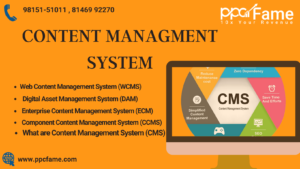

CONTENT MANAGEMENT SYSTEM (CMS)
A content Management System (CMS) could be a computer code that allows users to create, organize, deliver, and modify different content. It includes weblog posts, e-books, press releases, guides, and then on for websites, mobile applications, portals, and various online solutions to assist organizations in managing content and assets effectively.
Over the last twenty years, the content management system (CMS) market has evolved and reached thought adoption. There are different kinds of content management systems offered nowadays, listed within the following section.
Web Content Management System (WCMS)
A web content management system (WCMS) could be a content management system (CMS) computer code that controls the content, principally HyperText Markup Language content, consumed over many digital channels. It manages and maintains an intensive, dynamic assortment of net material (HTML documents and their associated images).
The web content management system is of 3 types: Open-source CMS, business CMS, and Custom CMS
- Open-Source Content Management System
- Commercial Content Management System
- Custom CMS
Digital Asset Management System (DAM)
Digital Assets are the muse of client expertise CX. Timely, accurate, and controlled access to digital assets is crucial. It allows the distributed groups to seek the excellent plus to deliver the proper client expertise through the appropriate channel. But while not the flexibility to access, manage, source, organize, harness, reuse, modify, and archive content from one supply – the expertise is broken or delayed. A digital plus management system (DAM) acts as a tool to concentrate assets, content, workflows, and operations across multiple business units, departments, and teams.
Enterprise CMS (ECMS)
An ECMS could be a CMS that helps collect, store, deliver, and manage an organization’s unstructured information – email, workplace or scanned documents, reports, etc. It permits the organization to possess the appropriate content for the targeted audiences (business stakeholders, employees, etc.)
Component CMS (CCMS)
A component CMS (CCMS) could be a CMS that focuses on organizing content at a component/granular level. Contrary to page-by-page content management in CMS, CCMS allows organizations to trace, manage, and store content in parts – words, paragraphs, phrases, or photos.
The CCMS is a perfect selection for media business firms that find business content across mobile, print, and PDF platforms.
What are CMS Features?
Every organization’s business wants to vary and settle on the most effective CMS platform, and you ought to guarantee its options map and your business goals and desires. However, some key CMS options are unit or ought to be acquainted with each CMS at the core.
The following may well be an inventory of the ten must-have CMS choices that will assist you in building and maintaining a website.
- Intuitive dashboard
- Easy-to-use interface
- Easy administration
- Built-in SEO tools
- Multi-language support
- Flexible preparation
- Security
- Support
- Multichannel business
- Extensibility
Conclusion
We square measure a unit inside the center of the significant transformation, the fastest digit upheaval there’s ever been.
The parameters ubiquitous high-speed property into centricity and smart device area units uniting quickly. This union can impact each side of content production and delivery.
One of the only intelligent choices you’ll be able to reach is to honestly assess your internal capability to deliver your own web page management system (CMS) resolution. However, the fact is that almost all businesses don’t have the resources and experience to run things themselves. Thus, if you’ve still not engaged a partner as a part of your CMS evaluation stage, it’s high time to find one.
Posted By : Pawan Manhas
